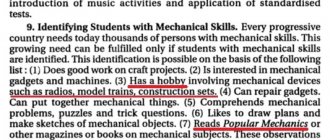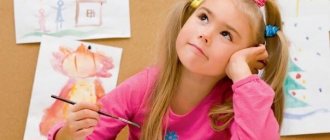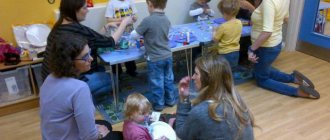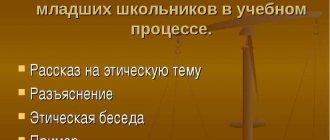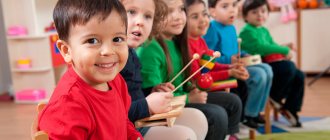Basic principles of spiritual and moral education of preschool children
Spiritual and moral education of preschool children allows them to correctly form a worldview, civic position, family values and moral guidelines.
Modern classes in the spiritual and moral education of preschoolers are based on Orthodox pedagogy, which contains spiritual and moral components necessary for the spiritual development of society and the state.
The spiritual and moral education of preschool children should be carried out through the joint efforts of parents and loved ones, teachers and educators. In the process of education, the historical continuity of generations, the possibility of passing on moral experience and setting a positive example are important.
The process of a child’s spiritual and moral development is especially important in the preschool period, when the formation of the basic qualities and habits of the individual occurs.
Within the framework of Orthodox pedagogy, spiritual and moral education is considered as the formation and development of an individual who has moral and spiritual guidelines, self-improvement in the service of good and self-determination in virtues.
The basic principles of spiritual and moral education of preschool children include:
- spiritual guideline - building life and actions on the foundations of Christian perfection, avoiding evil and choosing good;
- humanistic principle - the formation of a positive attitude towards the surrounding world and people, empathy and compassion;
- natural scientific principle, which is based on the scientific understanding of social processes, laws of development and formation;
- cultural principle in accordance with national culture, values and traditions;
- a state principle in which education is carried out in accordance with the legislation of the Russian Federation.
Effective classes in the spiritual and moral education of preschoolers should include scientificity and canonicity, multi-levelness, clarity, activity, systematicity and consistency, practicality and responsibility.
Stages of child moral development
Parents, educators and peers play a critical role in the development of spiritual and moral qualities, which at their core are a set of rules and expectations that determine behavior. At different stages of their development, children have different values, different points of view, and many connections that influence their moral development.
- Stage of punishment and submission. In the early stages of moral development, children are driven by the desire to avoid punishment and satisfy their needs through obedience to rules and simple choices between right and wrong.
- Stage of justice and equality. At this stage of development, children become selfish; they strive to satisfy their needs before others. Very rarely do children meet the needs of others.
- Stage of expectations and rules. With experience and help from adults, children progress to the next stage of moral development, where individual morality is shaped by interpersonal norms and the expectations of others (such as peers, teachers, and parents).
- Law and order stage. At this stage of development, behavior is characterized by obedience to the law, respect for persons in authority, and adherence to social rules and norms.
- Social contract stage. Outside of traditional ideas, appropriate behavior is based on social norms, rules and laws. However, care must be taken to ensure that individual values are not violated and that fairness is maintained.
- Stage of universal and ethical principles. Although behavior is often governed by rules, laws, and expectations, there are exceptional circumstances where independent judgment and moral reasoning may trump conventional norms in the decision-making process.
Goals and objectives of spiritual and moral education of preschool children
The spiritual and moral education of a preschooler is a long process that requires internal change, the acquisition of inner awareness and the desire for good.
The main goal of spiritual and moral education is the formation of a moral personality, the promotion of spiritual experience and familiarization with the values of Orthodox culture.
The main tasks of the spiritual and moral education of preschool children include:
- knowledge and inculcation of Orthodox culture and traditions;
- revealing the child’s spiritual and moral giftedness, his abilities and talents;
- harmonious, positive and humanistic development of the child’s personality;
- the formation of civic consciousness, a friendly attitude towards the surrounding world and people;
- spiritualization of the child’s living space;
- protection and strengthening of the physical, mental and spiritual health of the child.
The concept and features of spiritual and moral development in a preschool institution
Constantly changing political, social and economic conditions are the dominant factor, the influence of which determines the transfer of the interests of society and the whole state to the interests of the individual. The educational paradigm is undergoing significant changes, its content, goals and objectives are being thoroughly rethought, new processes and phenomena are emerging and firmly established. One of the dominant processes in the modern world can be called the process of spiritual and moral development and education, both in general education and in preschool institutions. [1]
It is education that reflects the modern sociocultural situation in the country. At the moment, the fundamental principle of educational organizations is “the humanistic nature of education, the priority of universal human values, human life and health, the free development of the individual, combining professional competence with civic responsibility, education of citizenship and love for the Motherland.”
One of the most important problems of modern society and the state in general is the issue of spiritual and moral education of children. The occurrence of this situation is due to several reasons:
The younger generation does not have the right positive life guidelines and examples of moral behavior;
Decline in the field of cultural and leisure activities with children and youth;
Propaganda by the media of cruelty and violence, advertising of alcoholic beverages and tobacco products further complicates the situation: material values are gradually replacing spiritual and moral ones, children’s desires are based on selfish principles and are determined by narrow personal needs, due to which children develop bad habits and disrespect for the older generation and the complete absence of any moral and ethical guidelines.
One of the main tasks of educational institutions is to prepare a fully formed, harmoniously developed personality who is able to analyze events occurring within society and the surrounding world and carry out their activities in accordance with the requirements and interests of the people around them and the norms of society. [2.12]
The goal of spiritual and moral education in a preschool institution is to enrich the child with spiritual and moral concepts and values, to develop his self-awareness and moral and ethical qualities.
The tasks of spiritual and moral education are as follows:
- to cultivate the moral qualities of the child’s personality,
- facilitate the child’s mastery of basic social roles, moral and ethical standards;
- have a positive impact on the formation of the moral, ethical, spiritual and moral qualities of the child, through the establishment of positive interpersonal relationships.
‒ to cultivate in every child hard work, respect for human rights and freedoms, love for the surrounding nature, Motherland, family;
- to introduce children to the cultural traditions of their people, universal values in a multinational state.
Raising a comprehensively developed and harmoniously formed personality, a necessary component of which is the spiritual and moral aspect, is the most important task in the development of modern society. According to leading experts, one of the newest stages of spiritual and moral education within a preschool institution is its integration into the child’s everyday life, into all types of educational and play activities and preschool education programs.
The younger age of a child is the basis for the formation and education of personal qualities and internal attitudes, the development of mental and physical strength, the acquisition and consolidation of knowledge about the world around us, the formation of moral and ethical skills and habits. The preschool age of a child is characterized by the active receipt, accumulation and use of moral experience. Preschool age is also the starting point of moral self-determination and the formation of self-awareness.
Constant systematic influence on the spiritual and moral side of a child’s personality is a fundamental link in the upbringing of a full-fledged member of society.
Spiritual and moral education in a preschool institution is one of the main aspects that influences the formation of skills for adequate interaction of a person with the world around him. This is, first of all, the general physical and mental health of the child, his intellectual potential and emotional state, ethical and aesthetic education, the formation of a worldview and self-determination as a part of society, family orientation.
Spiritual and moral development is a purposeful process of interaction between teachers and students, the main task of which is the formation of a harmonious and comprehensively developed personality, the development of its value-semantic sphere, through the communication of spiritual and moral values and social attitudes. The concept of “spiritual and moral values” includes a set of values that are dominant within the framework of relations between people, in the family, in society, norms and principles based on the criteria of good and evil, lies and truth. [3, 140]
Spiritual and moral development is inherently a rather complex, multifaceted process. It is an integral part of every person’s life in all its contradictions and completeness, part of the family, society, history, culture and humanity in general.
The content of the spiritual and moral development of a child’s personality lies in the consistent and systematic expansion of the value-semantic sphere of the personality under the influence of the processes of learning, upbringing and socialization.
“Spiritual and moral education” is understood as a process of positive influence on the moral aspects of a person’s personality:
- education of spiritual and moral feelings and moral and ethical attitudes;
- formation of moral character;
- the emergence and development of a moral position;
- manifestation of moral behavior within the family, society and the state as a whole.
The basis for the spiritual and moral development of a preschool child is, first of all, the family. One of the main tasks of a preschool educational institution is continuous cooperation with the family as part of the implementation of the learning process and moral education of students. The main task of this interaction is to study and analyze relationships in the family, prevent and resolve emerging conflicts.
The key link that determines the direction of the spiritual and moral development and upbringing of a child is the family. The modern concept of continuous interaction between the family unit and the educational institution is that parents are obliged to bear responsibility for raising the child, and the task of social institutions is to help and support within the framework of the educational process. That is why the education of spiritual and moral feelings in children must be carried out in close connection with parents and public organizations.
Literature:
- Petrakova T. I. Spiritual and moral education in a secondary school: categories, content, criteria [Electronic resource] - Access mode: https://www.verav.ru/common/mpublic.php?num=18.
- Solovtsova I. A. “The laws of human spiritual life as the basis of spiritual education”, I. A. Solovtsova “Problems of spiritual education”: Humanitarian-holistic approach: Materials of the “round table”, October 20, 2005 / Comp. I. A. Solovtsova; edited by N. M. Borytko. - Volgograd: Shopping Center “OPTIM”, 2006.
- Spiritual, moral and civic education of preschool children / Compiled by: Anikina T. M., Stepanova G. V., Terentyeva N. P. M.: TC “Perspective”, 2012.-248 p.
Methods and techniques of spiritual and moral education of preschool children
The spiritual and moral education of preschool children is carried out using various methods, techniques and means. The educational program should include various types of play activities (verbal, finger, role-playing, etc.), didactic materials, works of art, constructive and active exercises.
When using story-based and game exercises, it is necessary to focus the child on the moral side, empathy, mercy and compassion.
The program for spiritual and moral education of preschoolers should include the following types of activities:
- productive activities (making appliqués, figurines, designs, crafts, drawings);
- theatrical play activities (simulated skits and performances with spiritual themes);
- cognitive activity (reading historical and Orthodox literature, fairy tales, lives of saints);
- creative activities (plasticine modeling, painting and graphics, music, dancing);
- moral activity (lessons of love and kindness, acquaintance with Orthodox traditions and values);
- joint activities in which children and parents participate are aimed at the spiritual development of the family, strengthening family values, respect and mutual understanding (family and Orthodox holidays, games and competitions).
Video from YouTube on the topic of the article:
Summary of a lesson on spiritual and moral education in the senior group on the topic: “Good - bad”
If it's a clear day, that's good.
And when it’s the other way around, it’s bad.
You can hear them ringing high in the sky
Strings of sunlight.
If you are kind, it’s always easy,
But when it’s the other way around, it’s difficult...
Educator:
What is this song about?
Children's answers:
About kindness.
Educator:
Listen to this good proverb: “Life is given for good deeds.” Let's think about what children should be like?
Children's answers:
Kind, obedient, modest, hardworking, clean, compliant, generous.
Educator:
What should children not be like?
Children's answers:
Angry, lazy, disobedient, greedy, deceitful, stubborn.
Didactic game “Choose good deeds”
1. The boy helps his grandmother thread the needle. What a good boy! After all, grandma is old, her eyes can’t see well and she can’t cope without outside help!
2. The girl picks flowers in the flowerbed and collects them into a bouquet. This is very bad! Flowers grow in a flowerbed to make everyone beautiful, flowerbeds decorate streets, alleys, parks, but plucked flowers will no longer please anyone with their beauty.
3. The boy reads a book to his little brother. This is amazing! After all, my brother is still very small and doesn’t know how to read himself.
4. The boy washes the dishes. A very good deed! Mom will come home tired from work, and the dishes will already be clean!
5. A girl waters the beds in the garden. Well done! She's probably helping her grandfather or grandmother.
6. The boy climbed into a puddle and stomped his feet. This is very bad, because he will get all dirty and his mother will have to wash him and wash everything, and he may also catch a cold and get sick!
7. The big girl pushed the little girl off the swing and she fell and hit herself. Isn’t it a shame to offend little ones?
8. A girl in the park pours seeds into a feeder. What a good girl! She understands that birds are cold and hungry in winter!
Educator:
Guys, listen carefully to the poem “How to behave during the day?”
Educator:
Let's list the good deeds of the day.
Children's answers:
Don’t brag, try to please your loved ones with good deeds, say “Thank you,” don’t whine, endure unpleasant things, boldly fight evil, ask for forgiveness if you offended someone.
Educator:
Guys, now prepare the colored circles that are on your tables. I will read excerpts from literary works familiar to you, and you will determine whether the heroes act well or badly. If you think it is good, then show a yellow circle, if it is bad, show a blue one.
“Kolobok, Kolobok, I’ll eat you!” ( blue
)
“Masha walked and walked through the forest - tree after tree, bush after bush, and got lost!” ( blue
)
“The animals built a mansion better than before and began to all live in it together” ( yellow
)

